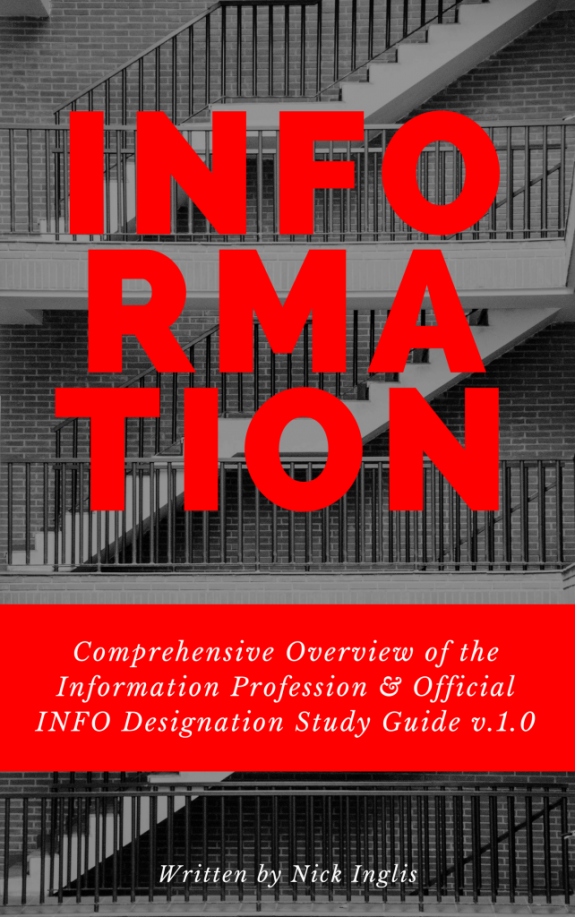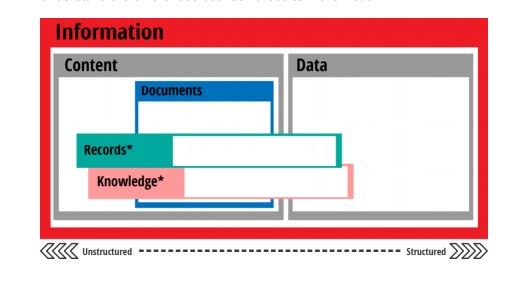
Nick Inglis will be speaking at NCC-AIIM chapter meeting on November 15th, 2018. In light of that I decided I write a review of his recently released book, “Information: Comprehensive Overview of the Information Profession & Official INFO Designation Study Guide v1.0.” The book is based on InfoBOK, The Information Body of Knowledge which is an open source body of knowledge developed by the Information Coalition.
In October 2018 the Information Coalition merged with ARMA International. I believe that one of the best resources that the Information Coalition has the left our community with is the book “Information: The Comprehensive Overview of the Information Profession & Official INFO Designation Study Guide.” This is a great resource for anyone in the Information profession no matter how long they have been in the field or what area they specialize in due to the many different subject areas this book covers.
Information is by Nick Inglis and was released in September 2018 at InfoBOK Summit 2018 prior to the InfoGovCon. InfoBOK is the Information Body of Knowledge which is an abridged version of Information (and over 100 pages shorter) and does not contain the analysis that is included in Information. The analysis in Information makes it worth the price as it adds a layer of richness to the text. InfoBOK is open source and was the culmination of two years of work amongst passionate information professionals that are a part of the Information Coalition. After the InfoBOK summit, attendees were presented a chance to sit for an exam to earn the INFO Designation that demonstrates an individual has the knowledge of the information profession.
Information consist of two sections. The first of which is a birds-eye view of the Information Profession. In this analysis it defines an Information Profession as a “loosely defined group of people, working in companies, whose primary function is related to information – this includes everyone from CIOs making major policy decisions and leading their organizations through to imaging specialists sitting in front of scanners with piles of paper to digitize.” It next defines the disciplines that an information professional can work in as one of the following categories: archiving, compliance, information leadership/strategy, information management, information technology (IT), legal, privacy, records management and security.
An interesting distinction that Inglis makes is having Information Management and Information Leadership/Strategy as separate categories. In the past I have used these terms interchangeably. Inglis makes a valid point that there needs to be a separation between these two categories even though there may be some overlap in the roles that perform these functions. In a section on Foundational Concepts Inglis discusses how Information Management and Information Leadership/Strategy must coexist and not be merged as the same thing when he states on page 58, “The terms ‘Governance’ or ‘Strategy’ should be used to describe high-level planning, policy and coordination. Whereas the term ‘Management’ should be used to describe the tactical execution of said planning, policy and coordination.”
If the information professional is to grow and mature we must all speak the same language which is why Inglis wrote Information. Inglis introduces the section on Foundational Concepts by stating, “Words matter and word choices matter. In any profession that is looking to move forward in maturity, there is often vernacular issues that make gaining a comprehensive understanding of the profession, a challenge.” As I talk to other Information Professionals very few people come into the field the same way. We all have different backgrounds and different areas of specialty. Information is important because it gives us a common knowledge so that the terms we use have the same meaning and we are all able to communicate together and say the same thing.
The second section of Information is the InfoBOK with analysis. The InfoBOK divides the Information Profession into four categories that encompass all of the elements of the information profession and those are core elements, risk elements, structural/process element and value elements. Lastly, there is a fifth category for emerging elements that are still making their way to the forefront. One of the problems of having a section like this in a book is that something that may be emerging in 2018 can be obsolete in 2023. Only time will tell and it’s a section that will obviously be updated in future editions as disruptors will always be presenting new emerging elements.
The InfoBOK with analysis is the core of the book as the core elements consist of 16 subject areas, Risk Elements and value elements contain 10 subject areas each, Structural/Process elements contain 20 subject areas and Emerging Elements contain 7 subject areas. There is no area that isn’t left uncovered in this book. I found so much value in Information and the analysis that it contains that I bought a copy for my boss. Any Information Professional who gets a copy of this book will have no excuse to not order copies for those looking to grow in the field.
Every Information Professional should read the Foundational Concepts that Inglis lays out in his book. Our profession is evolving with many new challenges ahead and Inglis lays a solid foundation for us to have a dialogue about how to face those issues with his chapter on Foundational Concepts. Aside from the difference between governance and management, other topics that Inglis covers in Foundational Concepts are:
- Content or Data Or Document Or Information Or Knowledge Or Record
- Records Management: Traditional Record Management, Electronic Records Management, Records Management (RIM) & Retention Management
- Information Lifecycle
- Capture, Digitization, Imaging, Native Creation, Scanning & Upload
- Information Assurance vs. Information Security
- Backup, Business Continuity, Disaster Recovery, and Information Assurance.
When Inglis presented at the InfoBOK and discussed the concepts of Information he stated that the one thing he wanted everyone to take away is that, “Everything is information.” D. Madrid who led the volunteer effort for InfoBOK followed that up with, “If we information management correctly, then records management will fall into place.” The Foundational Concepts in Information delves deeper into this idea and below is a visual representation from Information that represents the world of information that an Information Professional must be ready to deal with.

One of the reasons this book is such an invaluable resource is that it doesn’t just says records managers must be information managers, but that records is too small of a windows to view our world. Records live in the ecosystem of documents, content and data. To effectively management records we need to be somewhat versed in the over 50 areas comprised by the five elements of the InfoBOK.
Not every Information Professional was become a CRM, CRA, IGP, CIP, etc., but I believe going forward that every Information Professional should earn the INFO Designation. “Designed to test the basics/fundamentals of the Information Profession – the goal of the INFO Designation is to be a baseline test, open to everyone, to ensure they have adequate knowledge to serve in any role in the Information Profession (P. 48). For this reason Information will become a staple for every Information Professional. Aside from years of various experience, there is no better way to prepare for the INFO Designation or be a well-rounded Information Professional than to read Information.

